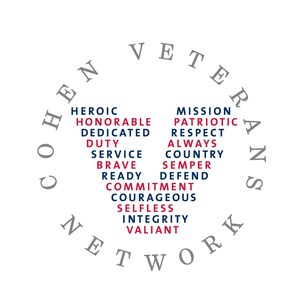Face the Fight®-supported research offers critical insights to enhance mental health care for veteran and military communities
STAMFORD, Conn., Oct. 3, 2024 /PRNewswire/ -- Committed to combatting suicide in the veteran and military communities, Cohen Veterans Network (CVN), a national not-for-profit network of mental health clinics for post-9/11 veterans, service members and their families, today released findings from new research related to its suicide prevention ecosystem. Supported by a grant from Face the Fight, the research holds significant implications for both clinical practice and training to help advance the field around suicide prevention.
Researchers conducted two distinct but related studies of CVN's suicide assessment and prevention ecosystem. First, they utilized qualitative interviews to examine client perspectives on suicide risk management processes across the network. Among their findings:
- Clients' development of connection and trust with their therapist was an essential element of therapy, creating a safe environment in which clients felt secure enough to share their experiences with suicidal thoughts and behaviors.
- Despite initial hesitancies, clients found safety planning and standardized measures to be beneficial when they were collaboratively implemented and meaningfully incorporated into therapeutic encounters.
- In-session skill building and practice empowered positive change.
- Lethal means counseling was better received when clinicians were direct in their approach.
"The significance of cultivating a therapeutic relationship that is understanding, supportive, and collaborative cannot be overstated," says Dr. Tracy Neal Walden, Chief Clinical Officer at Cohen Veterans Network. "By emphasizing empathy and encouraging open dialogue, our clinicians establish a strong foundation for effective intervention. With the support of Face the Fight, these valuable insights help us advance the field by enhancing clinical practice around suicide prevention."
In a second study under this project, researchers analyzed electronic health record data to identify predictors of clinically elevated suicide risk among veterans and active duty clients. Findings indicated:
- Depression and PTSD were strongly predictive of elevated suicide risk.
- A range of trauma exposures including adverse childhood experiences, military sexual trauma, and recent serious traumatic events were also predictive of suicide risk.
- Importantly, several social drivers of health, also known as social determinants of health, including housing and employment insecurity, and lack of social support were also linked to increased suicide risk.
These observations underscore the complex interplay of mental health conditions, trauma, and social drivers in predicting suicide risk among military members and veterans. "Our findings highlight the urgent need for comprehensive support systems that address mental health, and psychological trauma, as well as social, environmental and resource challenges faced by veterans and active duty service members," says Dr. David Linkh, Director of CVN-IQ. "By understanding the multifaceted nature of suicide risk, we can develop more effective prevention and intervention strategies tailored to the unique experiences of these populations."
To further explore the impact of social drivers of risk among vulnerable client sub-groups, the research team then conducted a comprehensive analysis of the unique social-environmental challenges faced by minoritized clients across Cohen Clinics. This work illuminates the significant role of case management in mitigating the impacts of these social risks through coordinated care and linking clients to necessary resources.
"Suicide prevention is a shared commitment, which is why we work collectively to support our veterans and service members," says Justin Schmitt, AVP of Corporate Responsibility at USAA, which founded Face the Fight. "At USAA, we are fully committed to partnering with organizations like Cohen Veterans Network to find solutions to reduce military and veteran suicide and better support those who have served our nation."
This research was led by the Cohen Veterans Network Institute for Quality (CVN-IQ). The institute, which launched in 2022, uses research, innovation, and collaboration with other military and veteran service agencies, mental health industry leaders and academic partners to improve treatment outcomes for veterans, service members and their families while enhancing their quality of life.
Since its inception in 2016, CVN has treated nearly 75,000 clients and provided over 635,000 clinical sessions. The network treats a wide variety of mental health concerns including transition challenges, depression, anxiety, PTSD, adjustment issues, anger, grief and loss, family issues, relationship problems, and children's behavioral problems. In addition to therapy, CVN provides comprehensive case management services which support clients with stressors including unemployment, finances, housing, and more. Care is available through the network's 22 Steven A. Cohen Military Family Clinics, serving 20 states in-person and via CVN Telehealth, face-to-face video therapy.
ABOUT COHEN VETERANS NETWORK
Cohen Veterans Network (CVN) is a 501(c)(3) national not-for-profit philanthropic organization for post-9/11 veterans, active duty service members and their families. CVN focuses on improving mental health outcomes, operating a network of outpatient mental health clinics in high-need communities, in which trained clinicians deliver holistic evidence-based care to treat mental health conditions. It was established in 2016 by philanthropist Steven A. Cohen with a commitment of $275 million to build the network. Learn more about CVN at cohenveteransnetwork.org.
SOURCE Cohen Veterans Network

WANT YOUR COMPANY'S NEWS FEATURED ON PRNEWSWIRE.COM?
Newsrooms &
Influencers
Digital Media
Outlets
Journalists
Opted In





Share this article